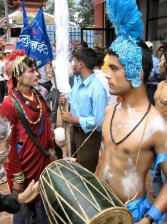NEPAL: Switching to bananas
JUGEDI, 31 March 2009 (IRIN) - Pushkar Timilsina, a farmer in Jugedi village, southern Nepal, has decided to replace his traditional crops with something different and unusual - bananas. 
Photo: Naresh Newar/IRIN 
Farmers across Nepal are feeling the impact of climate change, prompting some, such as Pushkar Timilsina, to switch to alternative crops
“The weather is becoming very unpredictable. We have to start preparing for the worst,” he told IRIN.
Timilsina is by no means the only one concerned. Climate change experts say many farmers in Nepal are feeling the impact of global warming in terms of reduced agricultural production.
Traditional crops like rice, wheat, maize and millet have had lower yields in recent years due to extreme weather (drought or floods), according to local NGOs involved in the agricultural sector.
The Intergovernmental Panel on Climate Change (IPCC) in its 2007 global report Up in Smoke? Asia and Pacific, expressed serious concern about food insecurity in Nepal due to changes in rainfall patterns. Livelihoods would be affected, it said, as over 75 percent of the country's 28 million people depend on agriculture.
According to the World Bank, around 31 percent of the population survive on less than US$1 per day.
“There is erratic rainfall and it’s worsening, causing farmers to suffer the most,” Dinanath Bhandari from Nepal-based international NGO Practical Action told IRIN.
A key activity of the NGO is climate adaptation activities, such as preparing farming families to cope with change, teaching them to grow new crops, and introducing drip irrigation and water storage schemes.
Timilsina is pleased with the changes he has made: “My family and local community were totally against the idea of replacing my traditional crops with bananas, which they considered merely fruit… But for me, it’s my life saver and brings in a lot of money to buy food in the market.”
In the two years since he started his banana farm, his family has more than doubled their income.
Erratic rainfall ![]() My family and local community were totally against the idea of replacing my traditional crops with bananas, which they considered merely fruit… But for me, it’s my life saver and brings in a lot of money to buy food in the market.
My family and local community were totally against the idea of replacing my traditional crops with bananas, which they considered merely fruit… But for me, it’s my life saver and brings in a lot of money to buy food in the market.![]()
Local NGOs have noticed that the monsoon rains have become increasingly erratic, and are tending to start earlier. July, traditionally the main paddy planting month, is now becoming drier.
“This means we have to struggle with often failed paddy production, which is our main food grain,” said Hari Lamichane, another local farmer.
In the past two decades, Lamichane has observed how the weather has changed and concedes he is now clueless as to when to expect rain.
“There was a time when we used to celebrate religious rituals during the traditional pre-monsoon period in May and June. We used to pray for rain. That doesn’t seem to make sense any more,” the 65-year-old said.
Temperatures rising
On average, the global temperature is rising by 0.06 degrees Celsius a year but in the high mountains it is rising at 0.08 degrees Celsius a year, according to the IPCC.
Landlocked and extremely mountainous, Nepal has experienced glacial melting at an alarmingly fast rate, according to various scientific studies. Hydrological cycles and the depletion of water resources have been highlighted by an Organisation for Economic Co-operation and Development (OECD) report as one of the main environmental challenges facing Nepal.
“Climate change is a big threat to our country. We need to start building our coping capacity at the national level before we run out of time,” Practical Action’s Bhandari warned.
http://www.irinnews.org/Report.aspx?ReportId=83711


